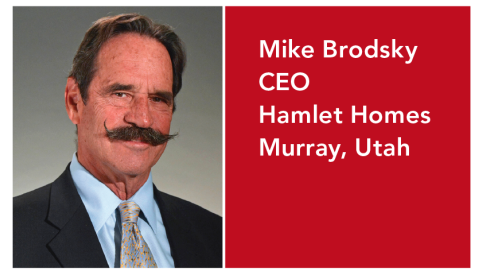Builders with a stagnant sales strategy who seldom review their product are headed for trouble. As the housing economy and target customers change, builders must be willing to take a hard look at their operations to figure out how they should adapt. We discovered three builders who stepped out of their comfort zone to examine their sales strategies — and profited. These builders — who sell in less-than-stellar markets — realized they had to make extraordinary efforts to increase and maintain sales levels — and did.

Weiss Homes - South Bend, Ind.

Weiss found its 'magic bullets' in revamped product and a design center built to beat competition.
When others were lamenting the housing market downturn, Weiss Homes got to work. This single-family builder knows it is not in the nation's housing hotbed and can't sit back and expect buyers.
"When you don't have that phenomenally hot market when you can just basically go out and collect checks, you always have to be smart about how to get people into you," says Corporate Counsel Rita Weiss, who runs the company with her husband, Dave.
Weiss Homes operates in north central Indiana and southwestern Michigan, known as "Michiana" territory. Over the last three years, Weiss Homes has doubled the number of annual closings up to 250 in 2006. That amounts to about a 30 percent share in Weiss' market, achieved with a multi-faceted strategy of diversifying product and showing it off well.
Back to the Drawing Board — Not the Unemployment Line
As a 40-year-old family-run business, Weiss has weathered economic swings and anticipated several years ago that builder boom times would not last.
Weiss typically revises a quarter of its design plans every year to adapt customer preferences to the value engineering it must produce as a production builder.
The company reacted to the market downturn not by laying off employees but by developing new product. It did its usual design review yet delved even deeper to come out with a lower-end product; sales staff felt there were potential buyers coming through with good credit who could not afford their prices.
Weiss Homes lowered the bottom end of its price range and added a third product line. Before the new pricing, Weiss' homes ranged from $110,000 to $250,000; prices now start at $90,000. Weiss Homes adapted its product by reducing some of the basement area and the number of comfort-height vanities, skirt boards and ceiling lights. "Instead of laying people off on the back end of the company — the estimators, the purchasers, the CAD people — we actually worked them harder," Rita says.
Lesson: When Traffic's Down, Serious Shoppers Remain
The husband-wife team also figured out something else: if bad times reduce the number of shoppers, then the shoppers who are left must be pretty determined. Weiss was equally determined to target them and took steps that put the company over the top.
In July 2005, Weiss topped its competitors by opening a 15,000- square-foot design studio that presents buyers an array of options for all rooms of their homes, from carpeting to cabinets to fixtures. Customers can input choices in the computer and have them priced on-the-spot. Open houses at the studio are held two Sundays a month. Sales staff also initiated reports on buyers' personality types and sent the information to the design studio and production staff so they could tailor their presentations accordingly.
The design studio also houses Foundation Mortgage, the finance company the Weiss' co-own. Sales staff are trained to present buyers with Foundation's capabilities, even for buyers with credit problems.
In 2004, Weiss expanded its sales center hours to seven days a week instead of the three days its competitors typically keep. The company advertised the hours, and traffic increased fourfold in some locations.
"It was not just one magic bullet for us; it's was about a whole lot of magic bullets at one time," Weiss says.

Ideal Homes - Norman, Okla.

A mastery of sales basics, maintaining commodity, keeps Ideal Homes on top.
Historically, Ideal has outpaced competitors in every soft market. That includes 2006, a record sales year for Ideal, Oklahoma's leading builder as measured by total market permits.
Co-owner Vernon McKown, president of sales, says Ideal spends little time reacting to short-term market cycles. Instead, it runs a disciplined strategy across its 15 subdivisions that keeps driving sales.
"It's just so common for your sales staff to hand out a flyer and tell buyers to have a look around and ask if they have any questions. They don't ever get in the game and sell them," McKown says.
Ideal builds around Oklahoma City's metropolitan area, targeting first-time and move-up buyers. Homes run between $100,000 to $300,000, which ranks some of the company's product in the low-price end of its market. Ideal had 525 closings last year.
Master Sales Basics
Ideal Homes stresses home sales basics: meet, greet, demonstrate, qualify, overcome objections, close.
"If you are not continually refining your sales presentations with your salespeople, they will get lazy and get away from it. As soon as they get away from the basics, it's only a matter of time before it reflects in their sales," McKown says.
And Ideal's salespeople face tough drills. Every Friday they are coached and role play sales scenarios. Twice a quarter salespeople are on the hot seat to role play in front of the other sales staff, who critique their performance.
McKown sends "mystery shoppers" to spy in on centers where sales are lagging. In many of these instances, he often finds salespeople not following through on strategies. That salesperson is pulled out, and when a good salesperson comes in, sales rise again. For McKown, that outcome often validates that the community product is good — it's the sales techniques that went sour.
Sales staff organization acts as an incentive for peak performance. Twenty salespeople cover 15 communities, and five representatives are floaters who fill in for vacancies and off days of regularly stationed sales staff. The best producers are permanently moved into a community. Low producers move around.
Distinguishing itself from the Pack
McKown believes buyers perceive homes in his market are all created equal — built to code, designed with similar floor plans and located in good areas.
In some cases, that might spark a price war between builders, but McKown refuses to battle.
"We have tried to stay out of the price game so we have always been 5 to 10 percent higher than our competition. You have to get your product out of being a commodity, and you have to differentiate your product," he says.
Ideal does that with its energy guarantee and has been honored nationally for the energy efficiency of its homes. Introduced in 2002, Ideal's two-year guarantee says it will reimburse homeowners the difference if heating and cooling costs exceeds pre-determined levels.
"That's where your energy guarantee comes in and you give customers a compelling, logical reason to make an emotional decision," he says.
Building homes that enabled Ideal to offer that guarantee was easier said than done. The company trained contractors to correctly install insulating, energy-saving features.
Although the energy guarantee has definitely been a selling point, McKown says it isn't responsible for the lion's share of Ideal's success.
"You can blow the energy efficiency right out the window if you get down to good, basic selling," he says.

Tributary at New Manchester - Douglas County, GA.

Builders gave centralized marketing in this master-planned community a try — and it worked.
Builders in the Tributary master-planned community have bucked the Atlanta-area trend of quality developments growing north of the city and turned buyers' heads to the west.
Tributary is just beyond its infancy and features 11 builders who offer a variety of housing, neighborhood choices and price ranges. The mixed-use plan for Tributary's 1,475 acres includes a range of residential neighborhoods, retail space and office buildings. When it's done, Tributary aspires to be the metro area's largest concentration of home sites modeled after a traditional neighborhood development concept.
Launch conditions were less-than-optimal; the development lies in a soft market in an undesirable area in suburban Atlanta. But Tributary combated the problem with a Web and radio-heavy advertising strategy and an extensive, diversified community that's unequaled in its market. Most importantly, its builders took a leap, too, by putting faith in a centralized sales center that would become a stronghold of the community's success.
Leland Homes was one of those builders.
A Sales Staff not their Own
Tributary has had success with an anomaly for builders: centralized sales. The community has one large sales center and 12 models for registered visitors to tour.
"We felt that this community was so unique and was going to be so well delivered to the market that I felt giving up my sales was OK," says Mark Gibbs, president of Leland Homes, based in Marietta, Ga. "Each of their products was for a different customer. I did not feel that the sales agents were going to make me compete with other builders."
Builders can have sales staff representation elsewhere in the development, too, so their companies still have sales influence. David Gernatt, project manager at Tributary for Houston-based David Weekley Homes, says David Weekley's efforts at Tributary are greatly enhanced by including a customer consultant. The consultant works out of David Weekley's models to interact with customers and is a liaison to the centralized sales staff. The consultant assists with writing contracts and manages the entire sales process after the contracted is executed. Gernatt calls the consultant "a must in a centralized sales situation."
On a weekly and quarterly basis, the centralized sales team shares information with builders on where visitors are coming from. Agents also have rotating assignments to walk builders' lots and give feedback to fine-tune builders' presentation.
Leland Homes altered its product slightly after receiving the sales center's summary. The builder has moved almost exclusively to three-bedroom homes and will add granny flats and third-floor space in its next building phase.
The basics behind Tributary's sales also contribute to its success. Home prices from Tributary's builders overlap slightly, but not by much. The different categories are determined mainly by lot size and square footage and are designed to appeal to distinct customer groups. All home designs came from calculated plans from the developer, Douglasville Development, with choices that don't duplicate each other and comply with architectural requirements.
"Our buyers actually take comfort in the fact that we are not discounting the prices, and to do that, you have to get the product right," says Richard Mildner, COO and general manager for the developer.
In 2006, Tributary's first full year of sales, sales totaled 154 with an average price of $350,000, nearly twice the average sales price in Douglas County.
"We are in a master-planned community that is probably drawing more traffic than anyplace in town — so where would you rather be in a difficult market?" Gibbs says.
Advertisement
Related Stories
Hamlet Homes' Mike Brodsky on Finding Successors and Letting Go
A transition that involved a national executive search, an employee buyout, and Builder 20 group mentorship to save the deal
Time-Machine Lessons
We ask custom builders: If you could redo your first house or revisit the first years of running your business, what would you do differently?
Back Story: Green Gables Opens Up Every Aspect of its Design/Build Process to Clients
"You never want to get to the next phase and realize somebody's not happy."






